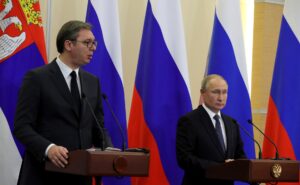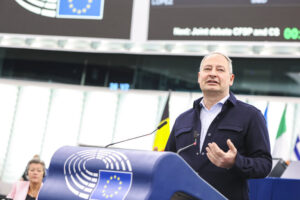The European Parliament has debated what MEPs call “the dire situation” in Serbia after recent elections were reportedly marred by “serious fraud claims.”
“Vote buying and theft, bussing voters to Belgrade, the hate speech in the campaign, harassment of journalists and civil society, biased media, misuse of administrative resources, possible Russian or other foreign malign interference and manipulation – these are extremely worrying reports of electoral fraud that call for an independent investigation.
“There is no doubt that the political crisis in Serbia – a candidate to become an EU member state – requires our full attention.” Tonino Picula, the S&D spokesperson for foreign affairs, also commented.
“This is not only a debate on the latest elections in Serbia, but also on the EU’s relationship with Serbia and the entire Western Balkans, as the stability of Vučić’s regime reflects instability of other countries in the region, namely Bosnia and Herzegovina, Montenegro and Kosovo.
“For all these reasons, we reaffirm our strong belief that to enable a better and European future for the region, the EU must stop its appeasement politics towards Vučić and ensure that Serbia, as the biggest country in the region, fully assumes its responsibility for stability and peace in the Western Balkans.”
Aleksandar Vučić and Vladimir Putin.

Aleksandar Vučić and Vladimir Putin in the Kremlin, 2019.
Allegations regarding Vučić’s connections with Putin have been a subject of speculation and debate in both domestic and international circles.
Critics have pointed to various instances where Vučić and Putin have seemingly strengthened their diplomatic ties.
These alleged connections have raised questions about Serbia’s foreign policy orientation and its implications for regional stability.
The most significant point of contention often revolves around Serbia’s stance on certain geopolitical issues, such as its relationship with the European Union and its handling of the Kosovo question.
Critics argue that Vučić’s close ties with Putin may influence Serbia’s alignment with Russia, potentially at the expense of stronger integration with the EU and other Western institutions.
Serbia has been a candidate for membership since 2012.
While some observers argue that these connections are indicative of a strategic balancing act in Serbia’s foreign policy, others express concerns about the country becoming overly reliant on Russia.
Allegations of political influence and interference have also been raised, but concrete evidence supporting these claims is often elusive.
Main image – Photographer: Philippe STIRNWEISS Copyright: © European Union 2024
Image (Vučić’ & Putin) Kremlin.
______________________________________________________________________________________________________________________________________

EP Plenary session – New development in allegations of corruption and foreign interference, including those related to Morocco, and the need to increase transparency, integrity and accountability in the European institutions
Read also: “Authoritarian countries, such as Russia and China, are trying to divide and weaken the EU,” says Andreas Schieder MEP

Follow EU Today on social media:
Twitter: @EU_today
Facebook: https://www.facebook.com/EUtoday.net/
https://www.facebook.com/groups/968799359934046
YouTube: https://www.youtube.com/@eutoday1049

